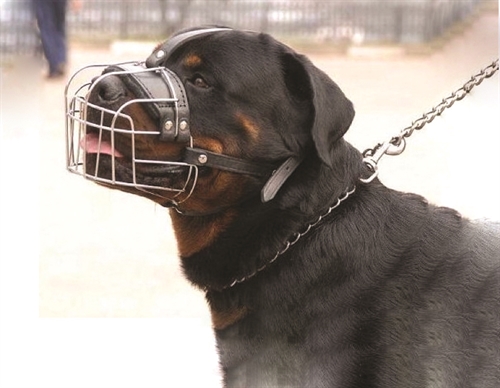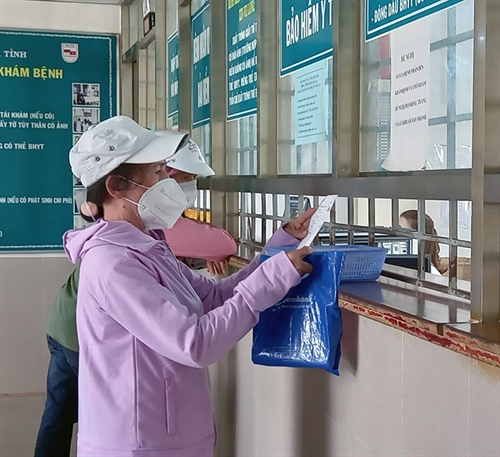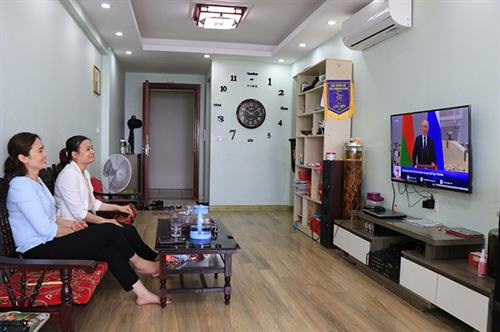In mid-May, local media all at once reported the death of an 82-year-old woman after she was attacked by her daughter’s pit bull at their home in the southern province of Binh Duong.
The incident occurred when the daughter took the dog out of the cage to feed it as her mother sat in the living room, approximately 15m away. Being hard of hearing, the mother spoke loudly to her daughter but the noise startled the animal and it rushed toward her. The daughter tried in vain to separate the pet, but after an attack lasting around two minutes, the elderly woman died.
 |
| When out in public, dogs must wear a muzzle__Photo: Internet |
Unfortunately, this is not the first time such a fatal pit bull attack has taken place in the country. In September 2022, a 64-year-old woman in north-central Thanh Hoa province died from serious injuries two days after being attacked by her pit bull. In last July, an eight-year-old boy was fatally attacked by a 30-kilogram pit bull at a house in the southern Binh Phuoc province. Earlier in May 2021, two pit bulls in the Mekong Delta province of Long An mauled a man to death and injured their owner when the latter tried to intervene.
After the latest tragic incident relating to pit bull attacks in Binh Duong province, a question is raised among both the public and policymakers: Should pit bulls be banned as pets?
Hoang Son, a reader of the VnExpress International, shared his viewpoint in an article published in the newspaper’s column Readers’ Views.
“As someone who cares deeply for public safety, I think there are three reasons why people should not be allowed to buy, breed or keep pit bulls at home. First of all, a pit bull is potentially more dangerous than most other dog breeds. Looking at pit bulls, we can easily see their strong muscles and aggressive eyes. Secondly, whenever they are in the attacking mode, pit bulls always aim at the most vulnerable parts of the victims and are very persistent. Finally, it is very difficult to keep pit bulls under control if you raise them as pets. People who have pit bulls say it is not easy to train them compared to other dog breeds and that it takes just one minute of neglect for a pit bull to pose a danger to others.” Son wrote.
Being aware of how aggressive pit bulls are, Son, who used to run every morning in his neighborhood, has switched his routine to early morning since a neighbor bought home a pit bull and started to take it out for a walk right at the time he went running.
Pham Minh Hung, a reader of the online newspaper Dan Tri commented: “Why don’t we ban pit bulls like many other countries in the world? Those who want to keep pit bulls as pets should put the common good above their hobby.”
Lack of a breed-specific legislation
For the time being, Vietnam has no breed-specific legislation, i.e., a type of law that prohibits or restricts particular breeds or types of dog which are believed to be dangerous to humans and other animals. Hence, the raising of dogs in general and pit bulls in particular is governed scatteredly under the 2018 Law on Livestock Production, the 2015 Law on Animal Health, Government Decree 90/2017/ND-CP on sanctioning of administrative violations in the field of animal health (revised under Decree 04/2020/ND-CP), and Ministry of Agriculture and Rural Development Circular 07 of 2016 (amended under Circular 09 of 2021) on prevention and control of terrestrial animal diseases.
Under Article 66 of the 2018 Law on Livestock Production, dog owners are required to get their pets vaccinated against rabies and take measures to ensure safety for humans and other livestock, keep environmental sanitation and comply with veterinary hygiene requirements. Dog owners will also be liable to compensate for damage in case their pets attack humans or other animals. Meanwhile, according to Circular 07, those who raise dogs must leash, confine or keep their dogs on their premises. When out in public, dogs must wear a muzzle or be leashed and led by their owners. Those who violate these regulations will be subject to a fine of between VND 1 million and VND 2 million as specified in Decree 04.
Analyzing dog owners’ liability for fatal attacks by their pets, lawyer Le Trung Phat from the Ho Chi Minh City Bar Association said in case the victim of a dog attack dies on the spot, the dog owner might be subject to penal liability examination for unintentionally causing human death under Article 128 of the 2015 Penal Code and face non-custodial reform for up to three years or imprisonment of between one year and five years.
Talking to the Tuoi Tre Online, Nguyen Dinh Minh, former deputy director in charge of the National Institute of Veterinary Research, said it is not recommended to raise vicious dog breeds like pit bulls but if they are allowed to be kept as house pets, they must be placed under special control and management, otherwise it will be very dangerous to humans.
“Authorities should examine all necessary conditions before granting permission for raising vicious dog breeds,” Minh said, adding that families with children and old people must be banned from raising fierce dogs.
In a press briefing held by the Ministry of Agriculture and Rural Development a few days after the fatal pit bull attack in Binh Duong province, Director of the Department of Livestock Production Duong Tat Thang said the department is drafting a circular on management of domesticated animals other than livestock and poultry, including pets like dogs and cats.
“The circular will be formulated based on current laws, international experiences, and scientific evidences so as to ensure strict and effective management of aggressive dogs,” Thang revealed, adding that “the ban on or the tight management of dog and cat raising should be taken into account as fatal attacks linked to pets have affected our society.”
The circular is expected to be issued in late 2023 or early 2024.-









